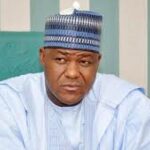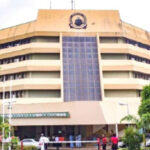The Managing Director and CEO of Development Bank of Nigeria, Anthony Okpanachi in this interview highlights efforts by the DBN to increase its impacts despite the global economic headwinds.
How would you evaluate the performance of DBN since its creation?
Since its inception, the institution has fared exceptionally well across various areas and this underscores our drive for Sustainability, which is one of our core values.
More specifically, in terms of providing financing support for MSMEs, from inception to end of 2021, DBN disbursed N482 billion to more than 208,000 MSMEs.
The Bank’s profitability has also remained resilient despite the challenging environment and the impact of COVID-19. Profit before tax and profit after tax stood at N22.7bn and N15.7bn respectively, translating to return on assets and return on equity of 4.8% and 12.8% respectively for 2021 which was our last audited financial period.
Across other metrics such as environmental sustainability, DBN has taken major steps to ensure that its processes and operations align with the global standards on environmental sustainability. A major feat in this direction is the achievement of the highest global rating of the Sustainability Standards and Certification Initiative (SSCI) by the European Organisation for Sustainable Development in 2021. In the same year, the Bank clinched the highest credit rating, Triple ‘A’ from Agusto & Co, and GCR.
How have the distortions in the global and national economy impacted the performance of the facility of the?
The headwinds from the global and national economy impacted DBN as much as they did to many other organizations within and outside the country. Consequently, these distortions made the pricing of DBN loans less attractive to financial intermediaries.
Nevertheless, we keep broadening our funding base to make financing more available for MSMEs in line with our overarching mandate to alleviate financing constraints for MSMEs in Nigeria.
In addition, DBN has various products and programs targeted at meeting the needsof MSMEs. For instance, DBN has an interest drawback program for its PFIs through which they grant rebates on loans to MSMEs playing within sustainability sectors such as renewable energy, waste management, etc.
The interventions of the CBN for Nigerian MSMEs did not disrupt the impact of DBN within the MSME space in that the financing needs of MSMEs within the system are enormous. And although DBN is poised and committed to solving these challenges especially as it relates to bridging financing gaps, MSMEs in Nigeria need several players to intervene in alleviating these constraints, which underscores the imperative for the CBN and other financial institutions to play their role in this area.
Would you rather the DBN becomes the channel for the series of interventions on the SMEs?
The challenges within the MSME space are quite substantial, especially as it relates to accessing finance. In light of this, these issues are best addressed when several players can provide support to this space.
Therefore, part of our role at DBN is to assess the objectives of these other institutions and collaborate with them to provide financing support to MSMEs. In many cases, DBN also offers technical assistance programs to these institutions to augment their capacity to lend to MSMEs.
What is the bank’s short, medium, and long-term focus?
In the short term, we plan to strengthen our catalytic role in the Nigerian economy by expanding our reach to more MSMEs in underserved regions such as crisis-impacted areas and enhancing development impact in other key areas such as women- and youth-owned enterprises, startups, and first-time borrowers.
We will also continue to build our internal capacity to drive the growth ambition of the institution. In addition, we plan to amplify our sustainability drive through the implementation of our green finance strategy, leveraging our SSCI certification, and exploring Green Climate Fund (GCF) accreditation as a direct access entity.
We also plan to crowd in more social and impact funding to build our balance sheet resilience amidst the challenging macro and business landscape.
Finally, to continue providing capacity building for MSMEs and technical assistance to our participating financial institutions to strengthen their lending capacity to MSMEs.
In the medium term, we plan to complete the digital transformation efforts currently underway within the Bank and expand our channels of disbursement to MSMEs, which speaks to our drive for increased collaboration with other players within the space.
In the long term, our focus is for DBN to be recognized locally and internationally as the foremost institution driving the growth and sustainability of the Nigerian economy through the provision of financing support to MSMEs.
There have been all sorts of economic projections by the IMF and the World Bank about the Nigerian Economy, what is your perspective?
The respective economic forecasts by the World Bank and IMF are broadly in line with the economic fundamentals in the country.
Notwithstanding, the economy is set for a recovery phase driven by several government policy support programs, reforms and interventions and rising crude prices.
Nigeria exited the pandemic induced recession in the fourth quarter of 2020 and output rose by 4.1% year on year in the third quarter of 2021, with broad-based growth except for the oil and gas sector which has experienced security and technical challenges such as pipeline vandalism, downtime of refineries due to repairs and of course reduced oil production.
The concern I see in terms of the macro-economic environment has to do with the headline inflation which rose sharply during the pandemic peaking at 18.2% year on year but has since declined to 15.6% in December 2021 aided by the new harvest season and re-opening of the land borders. As you may be aware, the Micro, Small and Medium enterprises have a lower savings propensity, so when there is an economic shock such as the Covid-19 pandemic, players in the MSME ecosystem are the first to be hit hard which then affects household income. The level of unemployment is another critical area of great concern.
Notwithstanding, the fiscal authorities’ proactive approach in containing the Covid-19 infection rates and subsequent fatalities has proven sustainable given the growth levels this far.
Are there any plans to raise funding from the capital market or equity investors to expand their investments?
As a DFI that is not just sustainability-conscious but has it interwoven into the fabric of the organization which is reflected in our core values, it is important we continue to strengthen our capital base. Also, this is one of our strategic initiatives which requires our continuous effort to crowd in more investments. To this end, we are on that pathway. We continue to expand our funding base both in terms of capital and debt as may be appropriate to meet the needs of MSMEs.
DBN facilitates credit for SMEs through the banks but your activities have remained largely unknown?
DBN is a wholly wholesale development finance institution. This means our key activity which is providing finance to MSMEs is carried out through financial intermediaries which we refer to as Participating Financial Intermediaries (PFIs).
Therefore, one of the major nuances of this model is that the PFIs become the face of DBN since the bank cannot interface directly with the end-borrowers. This, to a great extent, limits the level of knowledge even the end-borrowers have about the institution but not our impact.
However, in addition to the information we share from the lending activities through our PFIs, we shall continue with our other strategic initiatives for public engagements not only to create awareness of DBN’s catalytic role, but most importantly, to advocate for the MSME segment, the main drivers of the Nigerian economy..
SMEs are complaining that accessing credit from PFIs is cumbersome, in addition to high-interest rates, what is the DBN doing to ensure credit is accessible to SMEs at affordable rates?
To start with, without a drive on our part to alleviate these highlighted issues of accessing credit within the system, it will be difficult to describe DBN as a development finance institution.
We are well aware of the high-interest rate within the environment. Hence, as an institution, we strive to crowd in more social and impact funding to make financing more accessible for MSMEs amidst the challenging macro and business landscape and in line with our overarching mandate to alleviate financing constraints for MSMEs.
- In addition, DBN has various products and programs targeted at improving accessibility to MSMEs. The issue of high interest rate is a reflection of the Macroeconomic environment and crowding in several financing sources would lead to competition and ultimately, ensure market determined pressure to lower interest as we see in other climes.

 Join Daily Trust WhatsApp Community For Quick Access To News and Happenings Around You.
Join Daily Trust WhatsApp Community For Quick Access To News and Happenings Around You.


